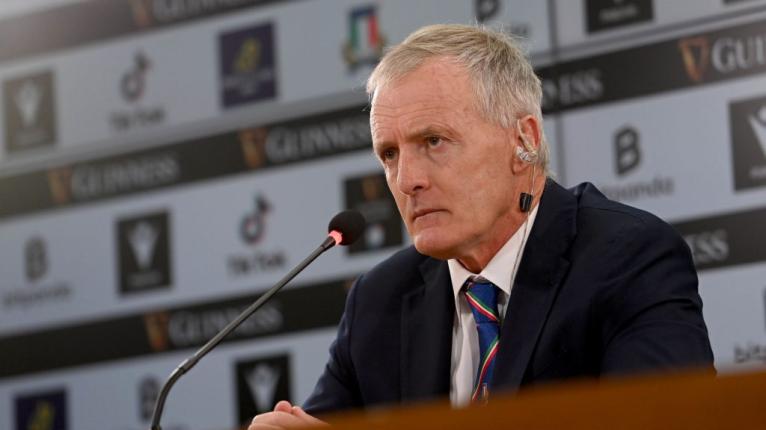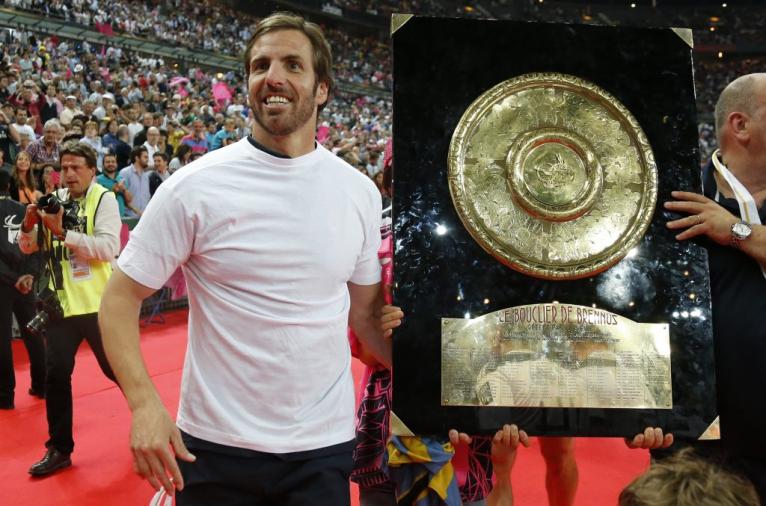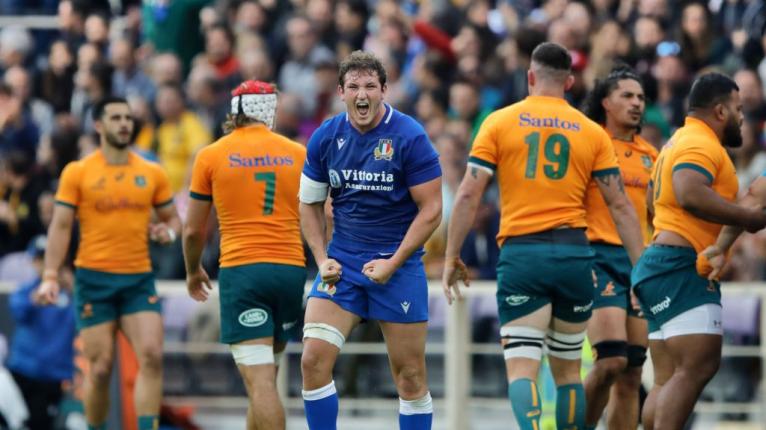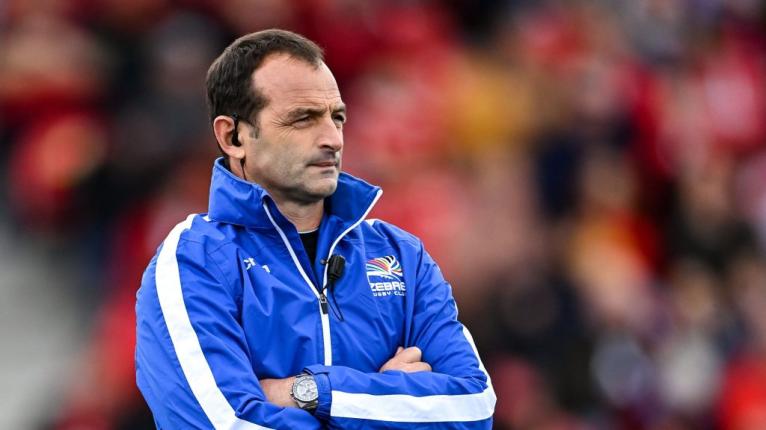After a Rugby World Cup campaign which won’t live long in the memory, a new era has dawned for Italy.
Kieran Crowley’s side comfortably beat Uruguay and Namibia to ensure automatic qualification for Australia in 2027 but fell miles short of threatening an earth-shaking upset against New Zealand or France.
Although neither of those defeats came as a surprise, losing margins of 79 and 53 points respectively left a bitter taste in the mouth as Crowley undeservedly bowed out with a whimper.
The popular New Zealander restored credibility and belief to the Azzurri over the last two years, masterminding landmark wins over Wales and Australia in 2021 and bringing through an exciting young generation of players with a fearless, attacking style.

But in June, the FIR [Italian Rugby Federation] made the unexpected announcement former Argentina international Gonzalo Quesada would succeed Crowley after the World Cup.
This was a shock not only because of Crowley’s impressive work and willingness to continue, but because Quesada was set to arrive with no experience in Italian rugby or as an international head coach.
That is not to say the ex-Pumas fly-half doesn’t boast an impressive rugby CV: as a player he earned 38 caps and was the top points scorer at the 1999 World Cup, while he coached Stade Francais to Top 14 and European Challenge Cup titles and led the Jaguares to the Super Rugby final in 2019.
Last week, Quesada was presented to great pomp and ceremony at an event in the cavernous Salone d’Onore of the Olympic Committee Offices in Rome.
RugbyPass headed along to hear what the new man in charge had to say as the public was given a first glimpse of the future.
Communication is key
The first thing which jumped out about Quesada was his grasp of Italian, impressive enough to hold a 90-minute press conference in the language despite being very new to it.
“Two months ago, I could only say ‘grazie’ and ‘per favore’,” he said.
“But I worked a lot to be able to speak a bit of Italian and for me this is very important.”
Quesada’s effort to pick up the language so quickly is an impressive signal of his dedication to the new role and will undoubtedly make his transition far easier – he also has English, French and Spanish in his linguistic arsenal if needed.
Italy ‘must have a solid defence’
Under Crowley, Italy always guaranteed entertainment thanks to their bravado in attack.
But while a gung-ho game plan earned some impressive scalps, it failed to stop a run of Six Nations wooden spoons which now stands at eight in a row.
In the 2023 championship, Italy kicked less and passed more than any other team but ended up with five defeats and more tries conceded – 22 – than anyone else.
Quesada was pressed on what changes he plans to make to the team’s approach and while the former Racing boss isn’t looking to tear things up, he did point to a greater focus on the nuts and bolts of the game.

“I like the ideas Italy have put on the pitch recently. I also have an attacking philosophy and I don’t think we will change that,” he said.
“However, we must improve at exploiting that in the right areas of the pitch while developing the fundamentals of the game.
“For example, at the World Cup, England and South Africa showed possession isn’t everything. Italy was the team that played the most from their own half in the last two Six Nations while finishing sixth for points conceded. That allows us to understand the attack is on the top level of what we are building.
“Firstly, we must build our identity, then we reinforce the basis of our game in relation to our identity.
“As a player I learned how difficult it is to play against Italy, a tough team that was strong in the scrum and with a strong heart.
“It’s on this base we can build: the defence, with more pragmatic exits from our own half, then at the end comes the attack.”
He added: “If we want one day to beat the five other teams in the Six Nations, we must have a solid defence.”
He doesn’t know the staff
Quesada has not brought his own staff with him, instead heading up the existing backroom team.
The unusual situation was another talking point at his unveiling, but the Argentinian downplayed its significance.
“I accepted the staff without any problems, even though it’s the first time I am working without already knowing who will be by my side,” he said.
“While it’s true I’m used to having a larger staff, I prefer to focus on what we have instead of what we lack. I’m happy with the staff I have.
“Italy has a good squad with great staff who have worked very well up to now, we have everything we need to do well. We will only have three days to prepare with the foreign-based players for the Six Nations, but we can still be ready for it.”
Will Lamaro retain the captaincy?
Michele Lamaro has become something of a fan favourite in recent years, with his rousing team talks and hair-raising renditions of the national anthem a poignant feature of this Italy side.
However, the Benetton flanker’s position as captain was not guaranteed by Quesada, who explained he will conduct a process before deciding on the leadership group going forward.

“I like working with the team leaders, but before this we have to define our common vision, our identity and working culture, and we will do this with the staff and the players,” Quesada said.
“After that, we will have our natural leaders. The captaincy will be a consequence of this process. It’s impossible for me to say today who it will be.
“I have seen all of the team’s matches, but that’s not enough to choose.”
World Cup positives and Under-20s promise
Quesada briefly reflected on the World Cup campaign in France, before touching on the work being done at Under-20 level – something which Italian youth rugby mastermind Stephen Aboud explained in detail to RugbPass in August.
“We can take away some good things from what the national team did at the World Cup, but we must improve some fundamentals in our game to be able to take on the best teams in Europe in March,” Quesada said.
Italy finished third in the U20 Six Nations this year, beating Scotland and Wales and picking up seven bonus points, before stunning hosts South Africa at the World Rugby U20 Championship in July as they ultimately finished 11th.
“I watched U20s tournament this summer in South Africa. The weather wasn’t perfect, but I saw the games,” Quesada added.
“I know a lot of work is being done with the youth academies in Italy, there are a lot of good things going on.
“All this work that is done to develop kids with these new academies and this new system is really good for the future. The results, especially in the last Six Nations for the Under-20s, were really good.”
The need for a common vision
The “common vision” was a persistent refrain.
The coach reiterated the need for a more overarching view of things before getting stuck into a Six Nations campaign – a view which will take in the full landscape of Italian rugby.
“Before coming into the job I followed the national team, I watched Benetton and Zebre and I spoke with the two head coaches from the clubs,” he explained.
“But before talking about the game plan my priority is to define a common vision with the staff.

“I’m convinced about my principles and my style of play, but the first job for me is to listen to what the culture of Italian rugby is.
“After that we can delve into this new adventure with the staff and players.
“Mine is a job that must be carried out with everyone – clubs, pro teams, the Under-20s, all of Italian rugby. I already feel a part of the Italian rugby family and I want to hear about it and find out more about it.”



Comments
Join free and tell us what you really think!
Sign up for free